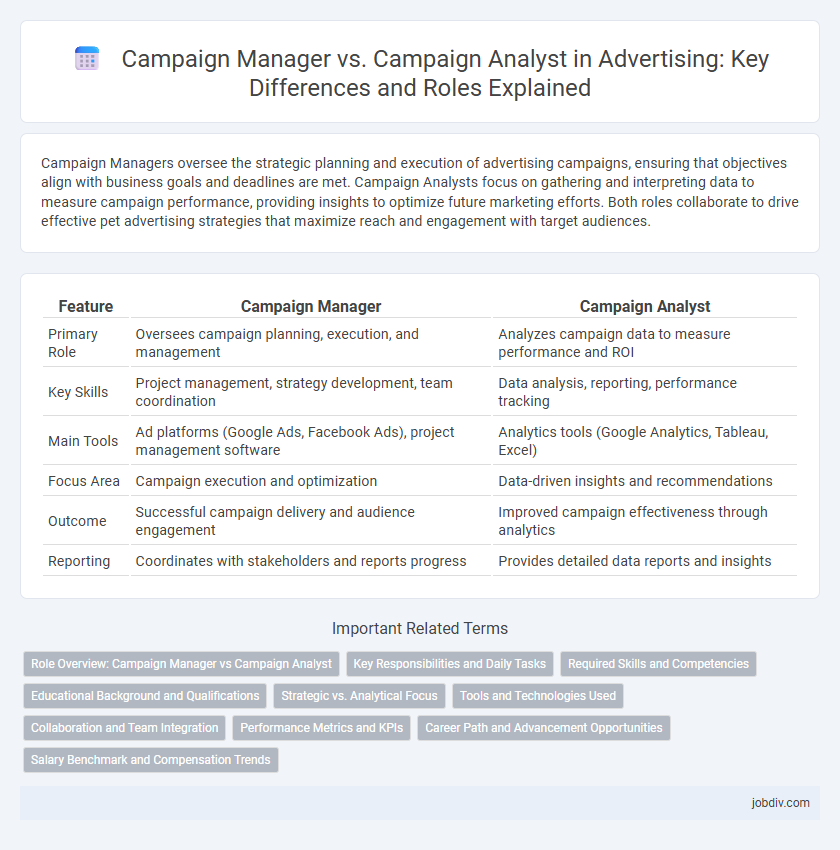Campaign Managers oversee the strategic planning and execution of advertising campaigns, ensuring that objectives align with business goals and deadlines are met. Campaign Analysts focus on gathering and interpreting data to measure campaign performance, providing insights to optimize future marketing efforts. Both roles collaborate to drive effective pet advertising strategies that maximize reach and engagement with target audiences.
Table of Comparison
| Feature | Campaign Manager | Campaign Analyst |
|---|---|---|
| Primary Role | Oversees campaign planning, execution, and management | Analyzes campaign data to measure performance and ROI |
| Key Skills | Project management, strategy development, team coordination | Data analysis, reporting, performance tracking |
| Main Tools | Ad platforms (Google Ads, Facebook Ads), project management software | Analytics tools (Google Analytics, Tableau, Excel) |
| Focus Area | Campaign execution and optimization | Data-driven insights and recommendations |
| Outcome | Successful campaign delivery and audience engagement | Improved campaign effectiveness through analytics |
| Reporting | Coordinates with stakeholders and reports progress | Provides detailed data reports and insights |
Role Overview: Campaign Manager vs Campaign Analyst
Campaign Managers oversee the planning, execution, and optimization of advertising campaigns to maximize reach and ROI, utilizing project management and strategic skills. Campaign Analysts focus on analyzing campaign data, measuring performance metrics, and providing actionable insights to enhance targeting and budget allocation. Both roles collaborate closely to ensure campaigns meet business objectives through data-driven decision-making and effective management.
Key Responsibilities and Daily Tasks
Campaign Managers oversee the strategic planning, execution, and optimization of advertising campaigns, ensuring alignment with marketing goals and budget constraints while coordinating with creative and media teams. Campaign Analysts focus on gathering and interpreting performance data, conducting market research, and providing actionable insights to improve campaign effectiveness and ROI. Both roles collaborate closely but emphasize different aspects: managerial oversight versus data-driven analysis.
Required Skills and Competencies
Campaign Managers require strong project management skills, strategic planning abilities, and proficiency in digital marketing platforms to oversee and execute advertising campaigns effectively. Campaign Analysts must possess advanced data analysis capabilities, expertise in analytics tools such as Google Analytics and SQL, and a deep understanding of key performance indicators (KPIs) to interpret campaign results and optimize performance. Both roles demand excellent communication skills and the ability to collaborate across marketing, sales, and creative teams to ensure campaign objectives are met.
Educational Background and Qualifications
Campaign Managers typically hold degrees in marketing, business administration, or communications, emphasizing leadership and strategic planning skills essential for overseeing advertising campaigns. Campaign Analysts often possess backgrounds in data science, statistics, or economics, with strong quantitative and analytical qualifications to interpret campaign performance metrics. Both roles may require certifications in digital marketing platforms, but Campaign Analysts prioritize proficiency in data analysis tools such as SQL, Google Analytics, and Excel.
Strategic vs. Analytical Focus
Campaign Managers prioritize strategic planning, overseeing campaign execution to align with business goals and drive brand growth. Campaign Analysts focus on data-driven evaluation, dissecting performance metrics to optimize targeting and budget allocation. The distinct roles complement each other by balancing strategic vision with analytical insights for successful advertising outcomes.
Tools and Technologies Used
Campaign Managers leverage project management platforms like Asana and Google Analytics to streamline campaign execution and track performance metrics. Campaign Analysts utilize data analysis tools such as Tableau, SQL, and Python for in-depth insights and trend forecasting. Both roles increasingly adopt AI-powered marketing automation software to optimize targeting and improve ROI.
Collaboration and Team Integration
Campaign Managers and Campaign Analysts collaborate closely to optimize advertising performance through data-driven insights and strategic execution. Campaign Managers focus on planning, launching, and overseeing campaigns, while Campaign Analysts provide detailed performance analysis and actionable recommendations. Seamless team integration between these roles ensures campaigns are both creatively aligned and analytically optimized for maximum ROI.
Performance Metrics and KPIs
Campaign Managers prioritize setting and optimizing performance metrics such as click-through rates (CTR), conversion rates, and return on ad spend (ROAS) to drive campaign success. Campaign Analysts focus on analyzing these KPIs in-depth, using data analytics tools to identify trends, measure engagement, and recommend data-driven adjustments. Both roles collaborate to ensure campaigns meet objectives by continuously monitoring key performance indicators and refining targeting strategies.
Career Path and Advancement Opportunities
Campaign Managers typically oversee the strategic planning and execution of advertising campaigns, making their role essential for leadership progression into senior marketing or management positions. Campaign Analysts specialize in data-driven insights, focusing on performance metrics and optimization, which paves the way for advancing toward data science or analytics leadership roles within advertising. Career advancement for Campaign Managers often involves broader team management, while Campaign Analysts move toward technical expertise and strategic data interpretation.
Salary Benchmark and Compensation Trends
Campaign Managers typically command higher salaries due to their strategic oversight and decision-making responsibilities, with average compensation ranging from $70,000 to $110,000 annually, while Campaign Analysts earn between $50,000 and $80,000, reflecting their focus on data analysis and reporting. Current compensation trends indicate a growing demand for analytical skills within marketing teams, driving gradual salary increases for Campaign Analysts. Competitive advertising markets emphasize performance-based bonuses and equity options for Campaign Managers to attract top talent.
Campaign Manager vs Campaign Analyst Infographic

 jobdiv.com
jobdiv.com